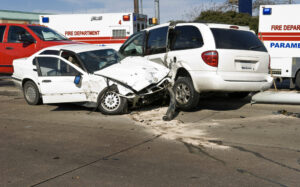Car accidents are a common occurrence on the roads of Kansas, often leaving victims with severe injuries, emotional trauma, and financial burdens. In such cases, understanding the legal principles governing fault and liability becomes crucial. One of the key concepts in Kansas car accident cases is comparative negligence.
What is Comparative Negligence?
Comparative negligence is a legal doctrine that allocates fault between parties involved in an accident based on their respective degrees of negligence. Unlike some states that follow a strict contributory negligence rule, Kansas adheres to a modified comparative negligence system.
How Does Comparative Negligence Work in Kansas
Under Kansas law, a plaintiff’s recovery in a car accident case may be reduced in proportion to their degree of fault. However, there’s a crucial stipulation known as the “50% rule.” According to this rule, a plaintiff can only recover damages if their degree of fault is less than 50%. If the plaintiff is deemed 50% or more at fault, they are barred from recovering any damages.
Example Scenario
To illustrate how comparative negligence works, consider a scenario where Driver A is speeding and collides with Driver B, who ran a red light. In this case, a court may find Driver A 70% at fault for speeding and Driver B 30% at fault for running the red light. If the total damages amount to $100,000, Driver B would be entitled to recover $70,000, reduced by their 30% share of fault.
Proving Comparative Negligence
Proving comparative negligence in Kansas car accident cases often involves gathering evidence, such as police reports, witness statements, and testimonies. An experienced attorney can help navigate the complexities of proving fault and maximizing the client’s recovery.
Why Comparative Negligence Matters
Understanding comparative negligence is essential for anyone involved in a car accident in Kansas. It can significantly impact the outcome of a case and determine the extent of compensation awarded to the injured party.
Navigating Comparative Negligence with Legal Representation
Navigating the intricacies of comparative negligence in Kansas car accident cases requires the experience of a skilled attorney. A knowledgeable lawyer can assess the circumstances of the accident, gather evidence, negotiate with insurance companies, and represent the client’s interests in court if necessary.
The Impact of Comparative Negligence on Personal Lives
Beyond the legal intricacies, understanding comparative negligence in Kansas car accident cases holds profound implications for individuals and families dealing with the aftermath of such incidents. This knowledge becomes a cornerstone in rebuilding lives, fostering resilience, and adapting to the changes brought about by unforeseen accidents.
Emotional Resilience in the Aftermath
Car accidents, regardless of their severity, can leave lasting emotional scars on those involved. The process of determining fault and the potential impact on compensation can further compound the stress and anxiety associated with such traumatic events. Individuals navigating the complexities of comparative negligence must find the emotional resilience to cope with the legal challenges while also prioritizing their mental well-being.
Community Awareness and Education
Understanding the principles of comparative negligence is not solely the responsibility of legal professionals. Communities at large can benefit from increased awareness and education on these matters. Initiatives that educate individuals on safe driving practices, adherence to traffic laws, and the potential consequences of negligence can contribute to a safer road environment for everyone.
Financial Implications for Families
Car accidents can lead to significant financial burdens, from medical expenses to vehicle repairs and lost wages. Knowledge of comparative negligence allows individuals to anticipate potential reductions in compensation based on their degree of fault. This awareness can prompt families to explore financial planning options, ensuring they can navigate these challenges with greater financial stability.
Encouraging a Culture of Responsibility
In embracing the concept of comparative negligence, society fosters a culture of responsibility and accountability. Drivers become more aware of the potential consequences of their actions on the road, promoting safer behavior and reducing the likelihood of accidents. By understanding the shared responsibility inherent in this legal framework, individuals are encouraged to exercise caution, empathy, and prudence when behind the wheel.
Impact on Insurance Practices
The knowledge of comparative negligence extends beyond the courtroom and influences the practices of insurance companies. Understanding the potential reduction in damages based on one’s degree of fault can prompt individuals to reevaluate their insurance coverage, ensuring they have adequate protection in the event of an accident. This knowledge becomes a proactive tool in managing risk and securing financial safeguards.
Understanding comparative negligence is paramount for anyone involved in a car accident in Kansas. The state’s modified comparative negligence system adds a layer of complexity to personal injury cases, emphasizing the need for a thorough understanding of the legal principles at play. By meeting the necessary requirements and seeking legal representation, individuals can navigate the aftermath of a car accident with confidence, knowing they are taking the right steps to protect their rights and pursue just compensation.
If you or a loved one has been involved in a car accident and needs guidance on navigating the legal process, the Melinda Young Law Firm is here to help. Our experienced team of attorneys is dedicated to advocating for the rights of those injured due to the negligence of others. Contact us today for a consultation and let us guide you through the complexities of Kansas car accident cases. Your rights matter, and we are here to fight for the justice you deserve.
